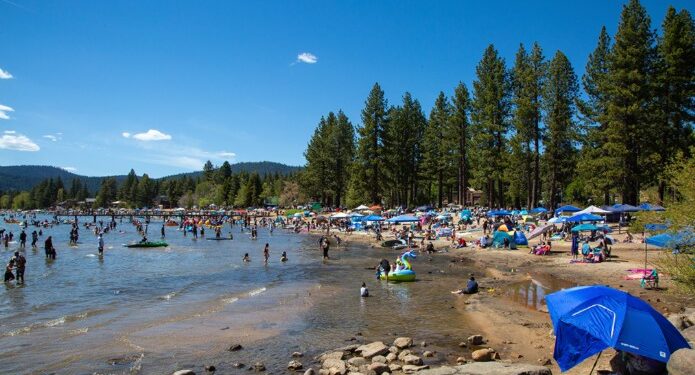By Cris Alarcon, InEDC Writer. (May 3, 2025)
SOUTH LAKE TAHOE, Calif. — As South Lake Tahoe emerges from the shadows of the COVID-19 pandemic, the resurgence of tourism is breathing new life into the local economy. However, this revival also underscores enduring challenges related to housing, infrastructure, and economic diversification.
Tourism, which now constitutes over 60% of Lake Tahoe’s $5 billion regional economy—up from 40% in 2010—has returned with vigor. The influx of visitors has spurred significant investments, including more than $500 million in renovations at area resorts, hotels, casinos, and restaurants.
The opening of Lake Tahoe’s first Target store on April 13, 2025, further signifies economic growth. Located at 4000 Lake Tahoe Boulevard, the nearly 64,000-square-foot store replaces the former Raley’s location and employs over 100 team members.
Despite these positive developments, the region grapples with longstanding issues. The pandemic highlighted the vulnerabilities of a tourism-dependent economy, including skyrocketing housing costs and a declining year-round population. A study by the Tahoe Prosperity Center revealed that exorbitant home prices and a shortage of workers have led to an economy that is “not healing itself, nor resilient to disruptive changes.”
In response, local authorities are exploring measures to bolster economic resilience. A proposed vacancy tax aims to increase year-round residency by incentivizing the occupation of vacant homes. The City of South Lake Tahoe estimates this could add up to $26.8 million annually in retail spending at local businesses.
Additionally, the El Dorado County Board of Supervisors has proposed allocating over $7 million from the Transient Occupancy Tax (TOT) revenue to the Lake Tahoe Basin, a 61% increase over the previous year. This move seeks to address concerns that the Basin has historically received only 25-28 cents back in services for every dollar of TOT collected.
However, tensions persist between the city and major stakeholders. South Lake Tahoe is engaged in a dispute with Vail Resorts, owner of Heavenly Mountain Resort, over annexation and the use of city infrastructure. The resort, situated just outside city limits, relies heavily on city services without contributing to local taxes. The city council is pushing for annexation to gain tax revenues and better control over services, especially during peak tourism periods.
As South Lake Tahoe navigates its post-pandemic recovery, balancing the benefits of tourism with the needs of residents remains a complex challenge. Efforts to diversify the economy, address housing shortages, and ensure equitable distribution of resources are critical to building a sustainable future for the region.










